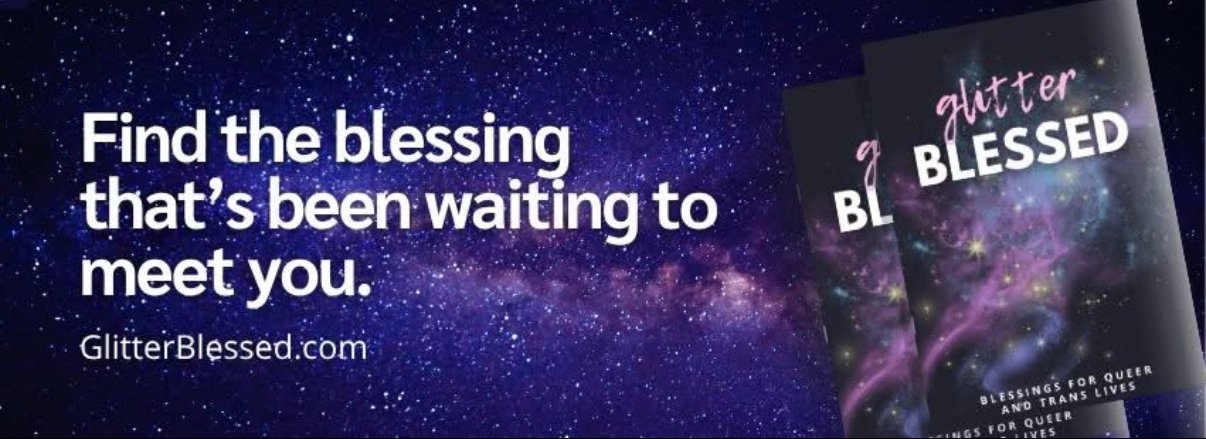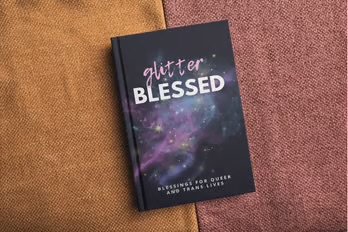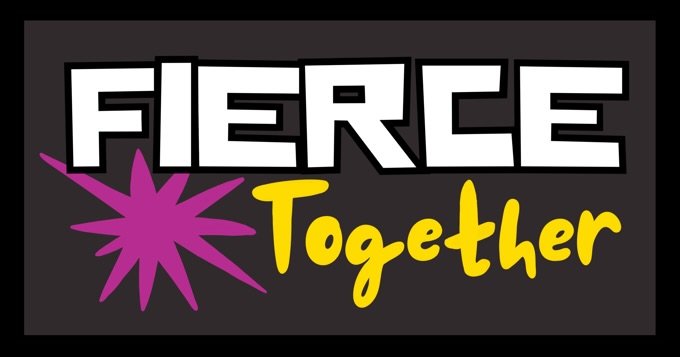GlitterBlessed: Already Whole, Already Holy

Micah (he/they) is Transmasculine/Nonbinary, and a Colorado transplant. He grew…
For this review of GlitterBlessed: Already Whole, Already Holy, I collaborated with Ryan Howell, Lead Pastor at Crossroads Church in Loveland and part of the Joint Doctoral Program in the Study of Religion at DU and Iliff School of Theology. Take it away, Ryan.
GlitterBlessed: Already Whole, Already Holy is a luminous and courageous anthology that offers blessings, prayers, and poems for queer and trans lives. Edited by my friend and colleague Rev. Sean Neil-Barron, this collection reveals the pain and longing of the queer and trans body’s experience. The collection is profoundly beautiful, necessary, and alive with hope. Each piece speaks to the longing for resilience and transformation, holding space for bodies and identities too often met with silence or shame.
What stands out is the tenderness with which this resource honors the sacredness of queer embodiment. From blessings for gender-affirming care to laments, celebrations, and quiet moments of survival, these writings insist that holiness is not something to be earned but something already present in queer and trans lives. The collection is fierce without being cynical, devotional without being dogmatic, and unapologetically affirming of love in all its forms.
As a pastor in the United Church of Christ, I long for more resources that speak blessing over queer and trans bodies, that call them holy, good, and beautiful. GlitterBlessed does exactly that. It is a glittering act of resistance and resurrection—a reminder that we are stardust, already whole, already holy.

OFM had the chance to talk with Rev. Sean Neil-Barron to learn more about this project.
The title itself, glitter, Glitter Blessed: Already Whole, Already Holy, feels like both a statement and an invitation.
I don’t exactly know where the phrase came from. After so many of the blessings that we would give, people would thank me as if I had given them something, but all I had done was just named what was already true. I’d ask, like, what do you need a blessing for? And then I would just affirm, just, you know, affirm the person, and then they’d be like, Thank you, as if, like, that was something new. It’s like, no, actually I’m just, I’m saying what has already been there the whole time, like, this blessing, this glitter, this moment, none of that actually makes you holy.
In a world where we are constantly told that we need to be something else, or even just we need to be better than we are to receive the blessing, I think that, whether it’s queerness or transness, that, like, the beauty (and) the pain of that has been, we’ve been told that we’re broken and deficient, and so the blessing is to recognize the already-ness of who we are.
How do you hope the book will live in the world?
I feel like the books that have the most meaning to me are the books that I’ve returned to again and again, that are kind of ratty and used. I think my biggest hope is that it’s something that people return to and find the blessing for the moment that they need. My deepest hope is that you return to the blessing that meant so much to you five years ago, and you realize that it means nothing to you right now because of the journey that you’ve been on.
Many people frame queerness and spirituality as opposing forces, but in your book, they seem to coexist naturally. How did you write in a way that shows they were never in conflict?
I think that being human is so much more sacred and mysterious and confusing than any one of us want to give it credit for. I think there’s so much possibility and beauty in that. A lot of shady churches and religious people think that we need to repress this part of us. Then I look at their lives, and I’m like, you are doing gender weird.
Queer and trans people are showing up, and they’re inviting us into truth and in mystery and wonder and appreciation and awe. That is what spirituality is about. They’re doing it in bodies that are real, that have pain and pleasure, and and they’re taking steps to affirm those things. That’s spiritual. I don’t understand spirituality outside the context of those things.
Was there a piece that you were surprised when you were writing it, that it was also meant for you?
I wrote the blessing for parents dragging their kids to Pride out of a very specific experience, the fact that my own child is terrified of drag queens.
The one that came to mind is called “Remembering,” for when you feel the absence of queer elders. I have this one friend who’s a late Gen-X gay man, and like, it’s been such a gift for me to be friends with him and to learn from him. He’s told me on many occasions, “I couldn’t imagine turning 40.” When I look at my own family, and my extended family is not very close, and when I think about the networks of my relationships, there’s this gap. There are people that came out way late in life, or were killed for who they were, or were neglected. There’s just a profound sense of loss and absence that is real. I believe that there’s a grief in me that has taken a really long time to name. Mostly, I wanted to affirm that grief and that pain.
If a reader could take away one message or feeling, what do you hope it is?
The thing that captivated me when I started collecting these things that I was writing I really wanted people to write and to name things and to say it’s not just like your generic life that it’s holy. It’s the injections of hormones, it’s the prep you take, it’s the antidepressant, it’s the hookup, it’s the naming and finding that kind of wholeness in the particular experiences that make up queer life. I want them to see each of those parts of their queer life, their trans distance, the blessing that they find in them.

Proceeds from GlitterBlessed: Already Whole, Already Holy will benefit Fierce Together, a mutual mutual aid for LGBTQIA+ performing artists, runs True You (our group for trans and gender-expansive kids and families), and produces A Drag Christmas Spectacular each year through Foothills Unitarian Church.
What's Your Reaction?
Micah (he/they) is Transmasculine/Nonbinary, and a Colorado transplant. He grew up in Southern Maine as a pastor's kid. They have found a passion for digital communication, using their skills to champion inclusivity and amplify marginalized voices. He is the Social Media Marketing Manager for OFM. Micah is also passionate about mental health within the queer community.










